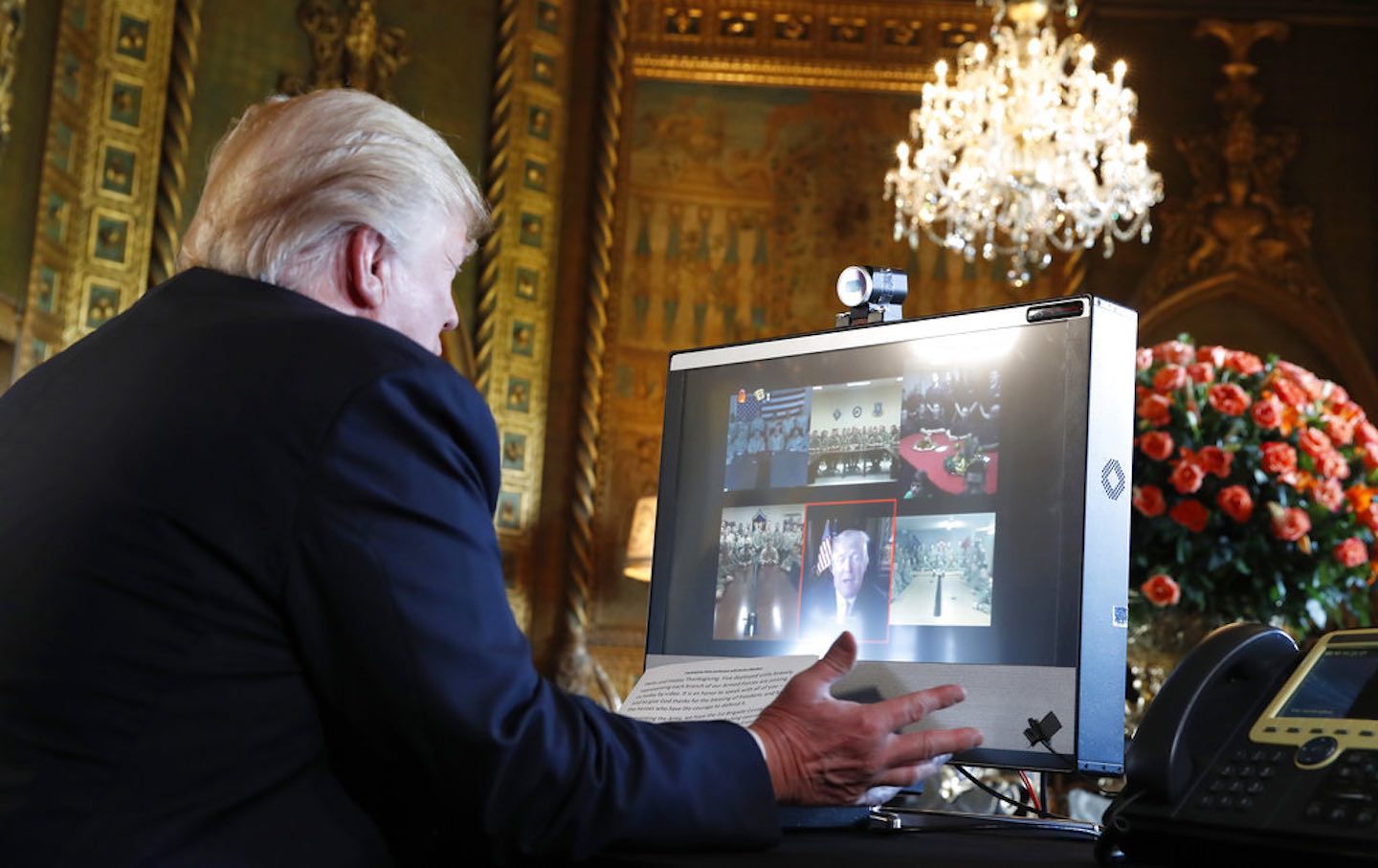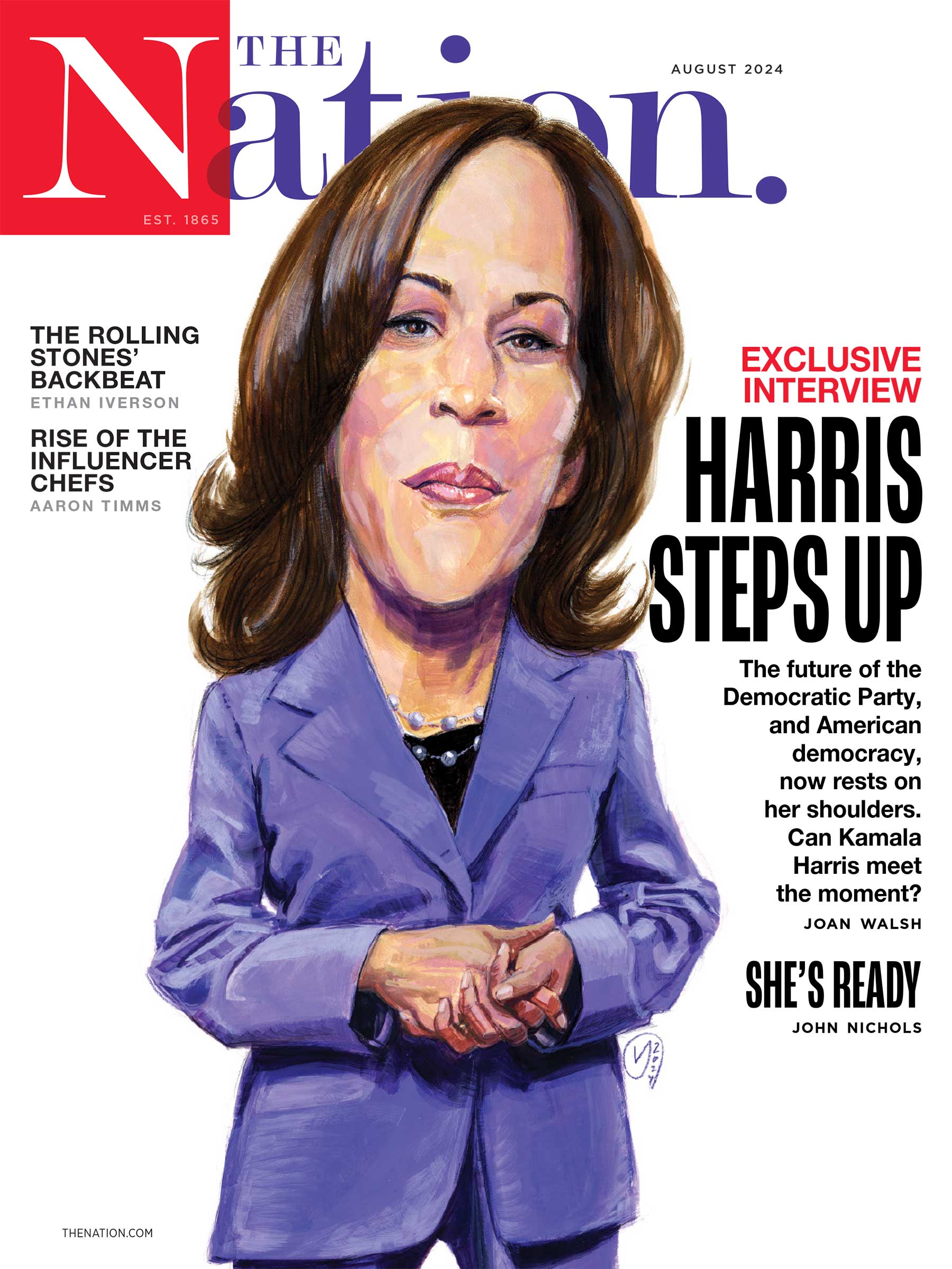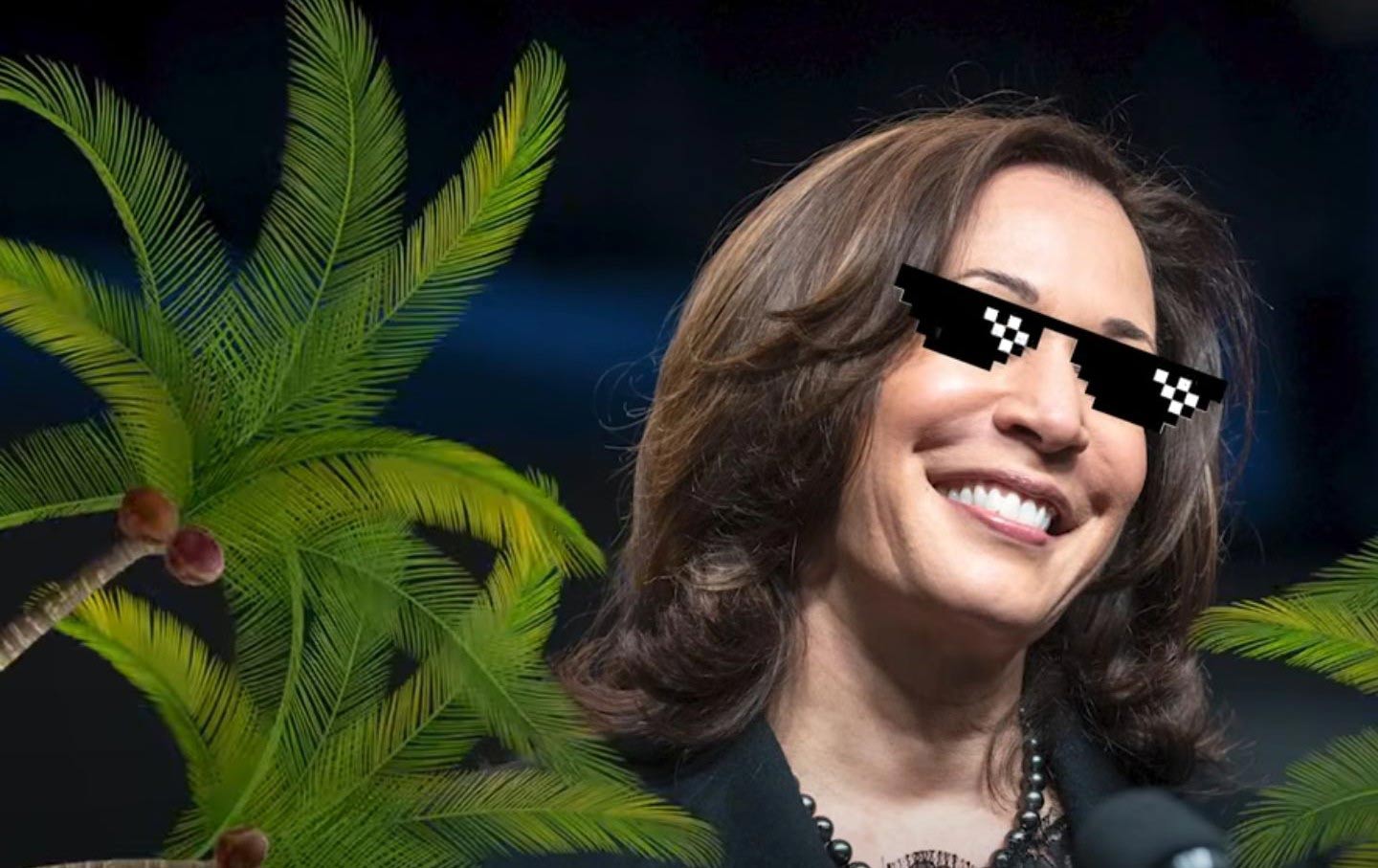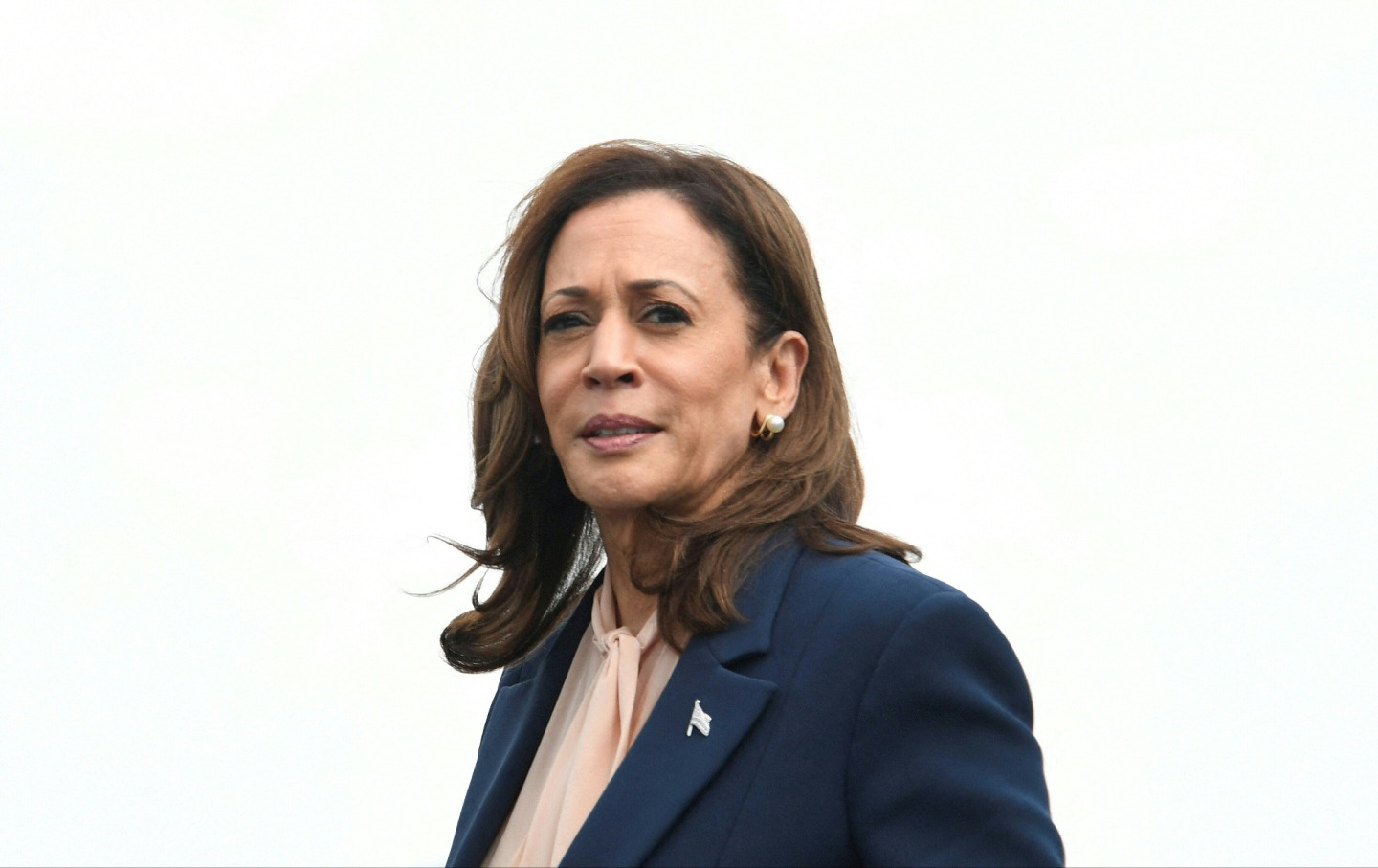
[ad_1]
Politics
/
August 14, 2024
The media went berserk over Hillary Clinton’s leaked e-mails in 2016. But when Trump campaign messages leaked this year, standards changed.

President Donald Trump speaks with troops via video conference at Mar-a-Lago, on Thanksgiving, Thursday, November 23, 2017, in Palm Beach, Florida.
(Alex Brandon / AP Photo)
The 2024 presidential campaign has seemed in many ways like a reprise of 2016, but with the lead coordinates reversed. Donald Trump’s MAGA-fied GOP now is the sclerotic establishment force—slow to adapt to changed circumstances, hidebound in its signature policy obsessions, and tone-deaf to challenges in the social-media sphere. Meanwhile, the Harris-Walz ticket is capitalizing on the race’s movement energy, drawing historic crowd sizes at its rallies, developing resonant campaign themes, and perfecting nimble attack strategies on the fly.
It seems fitting, then, that the race’s first big media saga involves a reported hack of Trump campaign e-mails—the mirror image of the 2016 Wikileaks dump of communications stolen from the servers of the Democratic National Committee. In a surreal twist, Trump campaign flack Steven Cheung warned would-be publishers of the leaked documents that “any media or news outlet reprinting documents or internal communications are doing the bidding of America’s enemies.” Suffice it to say that this was not the Trump campaign’s view of the Wikileaks dump.
Initial reports about the hack indicate that it may have originated from Iran, and that Harris campaign documents were also compromised. The FBI says that it has launched an investigation into the leak. Yet the most noteworthy thing about the story has been the media’s own response—or rather, non-response. Politico, The New York Times, and The Washington Post all received materials from the hack, and have apparently confirmed their authenticity. But all these outlets have only reported on the fact of the document release, not its contents, which are only referenced in exceedingly general and vague language.
The leak evidently includes a full vetting dossier on Trump’s running mate, JD Vance, along with portions of a similar candidate review for Vance’s erstwhile rival for the second spot on the ticket, Florida GOP Senator. Marco Rubio. But that’s all the knowledge the public’s been vouchsafed by the editors and publishers who fielded the leaks—again, a striking contrast with the Wikileaks trove, which fueled daily coverage for weeks, and turned John Podesta’s risotto recipe into readily repurposed clickbait fodder.
There are, in fairness, some salient differences between the two campaign leaks; Wikileaks had apparently fielded the DNC leaks from a foreign hacking outfit with Russian ties, and released the e-mail cache in one fell swoop. That meant news outlets were racing to stay on top of a story already in the public domain; the ensuing breathless coverage of the DNC leaks was, from this vantage, just one more instance of rival press organizations maniacally seeking to create the impression of world-shaking scoops in a vacuum. The controlled nature of the present leak has triggered a more chastened mood, it seems, in the sanctums of serious news judgment; hence the deliberate sidestepping of the actual substance of the leaked materials.
Commentators so far have hailed the diffidence of the news organizations shepherding the stolen documents. Thomas Rid, a cybersecurity analyst with Johns Hopkins University, told the Associated Press that the event of a foreign entity interfering with the 2024 election is all that’s newsworthy here. Semafor editor Ben Smith—who helped preside over the leak of the infamously sketchy Steele dossier while he was at Buzzfeed—hails the decision not to publish as “a reasonable call,” with the proviso that the same news organizations avow that “we screwed up last time.”
Current Issue

This is precisely the jaunty sort of self-assurance from news executives that should arouse suspicion. First off, without knowing more about what’s actually in the leak, we can’t reflexively deem the consensus on non-publication a reasonable call; that’s not how news judgment works. What’s more, for all the sound and fury surrounding the 2016 Wikileaks saga, there’s little evidence that the documents at the bottom of it were any more newsworthy than a Vance or Rubio dossier might be; they mostly confirmed the Democratic leadership caste’s diehard hostility to the Bernie Sanders campaign, which was something less than a breathtaking revelation.
There’s likewise little indication that the 2016 leaks turned the election decisively Trumpward; like other single-bullet explanations of Hillary Clinton’s defeat, such as Sanders’s ongoing primary challenge or the Comey press conference, the hype around the Wikileaks dump seems like a frantic search for alibis on the part of a colossally mismanaged and vision-challenged Democratic campaign. After making due allowances for a leaker’s agenda and motives, a news organization should decide whether to publish compromised materials on the chief basis of their claim on the public interest. Marginal as the claim may have been in the Wikileaks case, there’s still no firm basis to designate that decision a screw-up.
Which is not to say, of course, that mainstream news organizations haven’t been cowed by the decades-long plaint of media bias on the right into carrying water for conservative activists and causes. In this respect, the relevant point of comparison isn’t so much the Wikileaks dump as the New York Times’ decision to feature repurposed excerpts from Peter Schweizer’s 2015 diatribe on the foundation work of Bill and Hillary Clinton, Clinton Cash, in the run-up to the 2016 campaign. On its merits, that editorial choice was indefensible: Schweizer’s book was produced by the Government Accountability Institute (GAI), a group mounting character-based attacks on Democratic federal nominees that Schweizer cofounded with Steve Bannon, then the head of Breitbart News. Production and distribution costs for the book were underwritten by the UK-based Mercer Foundation, which funneled $1.7 million—more than the group’s total annual budget—through the GAI. The book was flagged for serial errors and misstatements shortly after its publication, prompting a batch of hurried corrections from the publisher.
Such is the craven and counter-journalistic logic of managerial fealty to right-wing charges of media bias: In the Clinton Cash episode, the clear diktat from the Times politburo was to embrace harebrained and unproven charges of self-dealing within the Clinton Foundation as a pre-election sweetener for the right. Times reporters could appease recalcitrant flacks from any Republican presidential hopeful’s campaign by reminding them of the yeoman’s work the paper had done in bringing Peter Schweizer’s indictment of the Clintons to such prominence.
Behind such twisted reasoning is a whole generation’s worth of inflammatory bullshit charges from the right that the American corporate media is a manufactory of Maoist agitprop. More than 30 years ago, Republican Party chairman Rich Bond conceded that the media bias industry on the right was simply an exercise in “working the refs” to skew mainstream press coverage rightward. That model of favor-seeking has since burgeoned into its own media counter-establishment, captained by Fox News, and directly stoked the resentment-fueled heart of the MAGA movement.
It’s striking, to put things mildly, that the same “paper of record” that went out of its way to treat Schweizer’s shoddy partisan hackwork as an urgent major political story now wanly reports that the leaked Vance dossier, “like many such vetting documents…contained past statements with the potential to be embarrassing or damaging, such as Mr. Vance’s remarks casting aspersions on Mr. Trump.” The slightest critical scrutiny gives the lie to such callow been-there-done-that posturing: If it is indeed the case that the Trump campaign’s file on Vance reprises previously reported accounts of Vance’s earlier career as a Never Trump Republican, that actually makes the deliberations surrounding his elevation to the veep spot more, not less, newsworthy. What, exactly, were Trump and his inner circle thinking when they tapped Vance as Trump’s running mate in the face of more than 270 pages of adverse intra-campaign analysis? The New York Times, Politico, and The Washington Post have apparently all decided that it’s their solemn civic mandate to ensure that we’ll never know. As usual, Trump, Vance, and their moneyed right-wing enablers are sneering all the way to the bank—and possibly the White House.
Can we count on you?
In the coming election, the fate of our democracy and fundamental civil rights are on the ballot. The conservative architects of Project 2025 are scheming to institutionalize Donald Trump’s authoritarian vision across all levels of government if he should win.
We’ve already seen events that fill us with both dread and cautious optimism—throughout it all, The Nation has been a bulwark against misinformation and an advocate for bold, principled perspectives. Our dedicated writers have sat down with Kamala Harris and Bernie Sanders for interviews, unpacked the shallow right-wing populist appeals of J.D. Vance, and debated the pathway for a Democratic victory in November.
Stories like these and the one you just read are vital at this critical juncture in our country’s history. Now more than ever, we need clear-eyed and deeply reported independent journalism to make sense of the headlines and sort fact from fiction. Donate today and join our 160-year legacy of speaking truth to power and uplifting the voices of grassroots advocates.
Throughout 2024 and what is likely the defining election of our lifetimes, we need your support to continue publishing the insightful journalism you rely on.
Thank you,
The Editors of The Nation
Chris Lehmann
Chris Lehmann is the DC Bureau chief for The Nation and a contributing editor at The Baffler. He was formerly editor of The Baffler and The New Republic, and is the author, most recently, of The Money Cult: Capitalism, Christianity, and the Unmaking of the American Dream (Melville House, 2016).
More from The Nation

The growing visibility and power of Indigenous movements have created enormous potential for fundamentally changing our world in a positive fashion.
Aviva Chomsky

The online jokes are not just about having fun. They represent a newfound political energy within the Democratic Party.
Ginny Hogan

Palestinian Americans have learned that the Democratic Party will bomb your homeland, kill your family, use your own money to do it, and still expect your vote.
Layla Saliba

In Lydia Millet’s We Loved It All, she compels readers to decenter human experience in the stories we tell about the natural world.
Books & the Arts
/
Julia Case-Levine
[ad_2]